Affiliate Marketing for Beginners: Your Complete Guide to Building Profitable Affiliate Sites

When you buy something through one of the links on our site, we may earn an affiliate commission.
The key to affiliate marketing for beginners is having an actionable plan for the affiliate business you want to grow. Successful affiliate marketing that translates into passive income takes time and effort. But, with the right business model and some of the tips and tricks we're here to share to make affiliate marketing work, it can be one of the best ways you can earn money online.
If you're just getting started with affiliate marketing it can easily seem overwhelming. After all, it involves finding the best affiliate networks to join, the products and services that will have mass appeal, designing an appealing website, creating content, SEO, building an email list, and more. Plus, the affiliate marketing industry is becoming more and more saturated which means there are other affiliate marketers that are going to be trying to drive traffic to their sites for the same products.
The good news is, that there is still lots of opportunity for the beginner affiliate marketer. This handy beginner's guide to affiliate marketing will walk you through everything you need to know to get started. From how to find affiliate programs and find products to what makes a successful affiliate, we've got lots of tips and tricks on how to make good money promoting products on your affiliate site.
How Does Affiliate Marketing for Beginners Work?
The concept of affiliate marketing is actually pretty simple. Affiliate marketers find products and services they want to promote, insert a unique link in their affiliate marketing content (social media, blog post, etc.), and earn a commission on every sale.
Some affiliate programs will have a low commission, while others will offer a high commission. The rates can vary massively from as low as 1% to sometimes as high as 80% for high end subscription setups or ecourses on Clickbank. Sometimes you can even earn bonuses depending on your niches.
The bottom line is that whenever someone clicks on your affiliate link or decides to make a purchase through your unique link—you receive a commission and make money. It's the online version of the old sales commission model.
Ultimately, there is a lot of time and effort that you need to be willing to put in up front. Keep in mind that affiliate marketing is one of the best ways to create long-term passive income, but the "passive" part comes later. Initially, you won't be making six figures and you should be prepared for some hard work.
Keep in mind that affiliate marketing vs dropshipping are two very different things, although on the surface they both allow you to “sell” products without ever having to house inventory yourself.
How to Get Started with affiliate marketing

There are affiliate programs for just about anything. How much money you can make over time depends on a lot of things. This includes the products you promote, the affiliate network you work with, and the traffic coming into your affiliate content. While you might be tempted by YouTube affiliate marketing, Pinterest affiliate marketing or marketing products on other social media platforms, the best way to get started with affiliate marketing is to set up a website.
To build a good website you need to understand the importance of a landing page and how to create high quality content. The next step will be building a good traffic source so you have a steady stream of potential buyers coming to your site.
Hand in hand with this, you'll need to decide what physical products or digital products you're going push. You also need to learn how to promote products effectively.
The more traffic that you can push, the better your results are going to be. More traffic means more sales and more money. Your job as an affiliate is to rank in the search engines, drive traffic from multiple sources, and then get those visitors to make a sale.
The affiliate program you're working with will be responsible for tracking your affiliate commissions. As the affiliate marketer, it's not your job to keep track of clicks or sales. The affiliate program should provide links that make it easy to track these metrics.
You may also look to work with an affiliate network. This way you can find lots of different affiliate programs for the products and services that you're interested in and you only have to sign up once. It's one of the easiest ways to find a lot of affiliate offers right away to start building an affiliate marketing business.
If you want to start making money as soon as possible, the more affiliate networks you join, the more affiliate marketing programs you sign up with, and ultimately the more products or services you can start promoting—the more likely you are to earn affiliate income.
Understanding Payment Terms

Obviously your goal should be to get started with high paying affiliate programs, but sometimes understanding how you get a commission can be confusing.
Payments will vary based on the affiliate program you are partnered with. Some programs will be pay per click or pay per lead, while most affiliate programs you will only earn a commission based on a sale.
Depending on the affiliate program, when you get paid can differ as well. Amazon tends to pay out two months after the end of the month in which the sale was made. This is to allow time for any refunds to be processed. Similarly, lots of programs also do 60 or 90 days for the same reason.
Some payments go straight to bank accounts, for others you may need PayPal or another payment processing system like Stripe. This tends to be especially true if you are based outside of the United States.
Choosing an Affiliate Platform Friendly to Beginners
Choosing an affiliate program is an incredibly important step. This can also be a little bit misleading as very few top notch websites only choose one affiliate program. Many big websites focusing on physical products are going to be Amazon Associates. Depending on the niche they might also look at other affiliate programs or networks that are specialized.
AvantLinks, for example, specializes in affiliate offers for major outdoor brands. Udemy and Clickbank are two major affiliate programs focusing on ebooks or online courses. Then you have general affiliate networks like CJ (formerly Commission Junction) have deals with thousands of companies. There are many programs that are user-friendly to websites just starting out. Any lesson on affiliate marketing for beginners is going to encourage these programs. For good reason.
There are also many individual programs, or affiliate platforms, that require a minimum amount of traffic. In those cases you need to provide a certain amount of value or hit certain goals before you can join. You may start out purely as an Amazon affiliate and then end up a few years later with dozens of affiliate offerings on your website. This is a natural part of growing the profitability of your website.
Amazon's Affiliate Program

The Amazon affiliate program is one of the most well-known affiliate marketing programs. It's also the one that many beginners choose to start with. This is because the name is universally recognized, the setup is easy, and the conversion rates tend to be high because buyers trust Amazon.
If you are new to the affiliate marketing business, I do recommend taking a look at the Amazon associates program. It's a relatively easy way to start affiliate marketing because of how many people are selling and buying through Amazon already. There are literally thousands of different products to choose from which means it's a great affiliate program regardless of your niche.
To get started with the Amazon affiliate program is pretty easy (check out our article on how to become an Amazon affiliate). You jut sign up, get your unique link for whatever products you want to promote and then hit the ground running. With up to 10% commission on certain programs or products, Amazon conversion rates are reasonably competitive. Plus, Amazon has custom linking tools for bloggers, website owners, and social media influencers. So, whichever platform you're looking to turn into your affiliate marketing business, you can promote products from Amazon.
Take a look at this Amazon affiliate website case study to learn more about how you can be a successful affiliate marketer with the Amazon associates program.
Anyone can join Amazon, with the only stipulation being that you need to make three sales within the first 180 days. The simplicity of setup and easy approval process often makes Amazon the best affiliate program for beginners.
Read our full Amazon affiliate program review or check out some helpful tips to increase Amazon affiliate clicks.
Clickbank
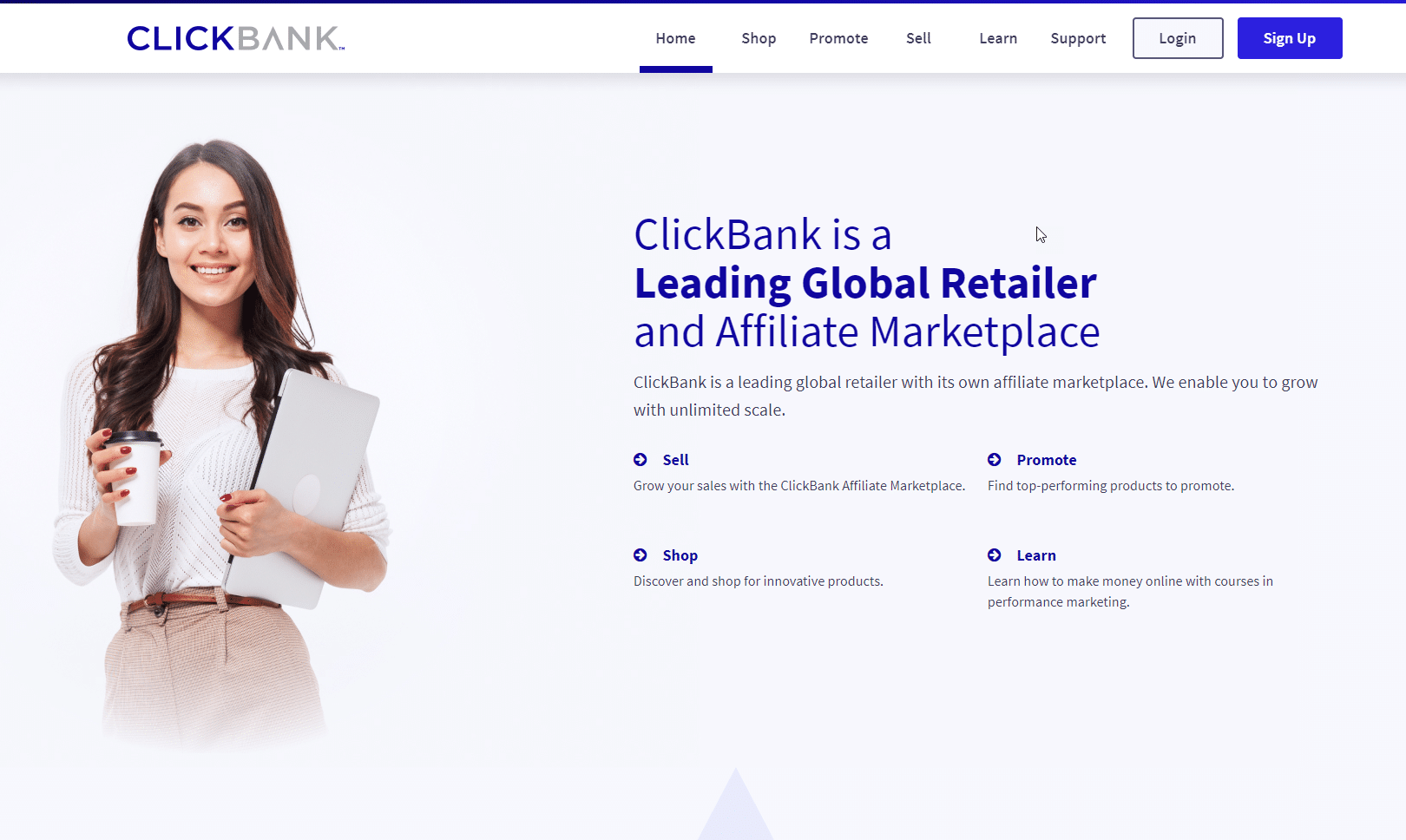
Clickbank has been around for quite some time. They were one of big names in ebooks and online digital products. This affiliate program is known for offering huge commissions for ebooks on digital courses. They don't sell any physical products. These courses cover a wide range of different topics. While it takes a little bit to get used to the information they give and how to use it, Clickbank can be a good option for certain niches.
The key is finding products in your niche that have a good information program that actually sells. Since the merchant is responsible for creating the content, the sales letter, and marketing themselves, some programs are going to sell way better than others.
This program is very easy to sign up, with is a definite positive when you're just getting started with affiliate marketing. For those who choose a niche that has one or several excellent products on Clickbank with good sales pages, this can be a great affiliate choice.
Read more about how to make money with Clickbank or check out our review of Clickbank University.
CJ

CJ is what you would call an affiliate platform. They don't represent just one website or one company. Think of it like an online marketplace. There are many thousands of merchants who join CJ and use their platform to reach out to potential affiliate partners. This means a huge number of choices across many different brands.
One thing to be aware of is that getting accepted to an affiliate program like CJ gives you the potential access to countless merchants. It does not automatically approve you to all of their programs. You will still need to apply to each affiliate program within the platform individually. This can get aggravating sometimes as there will be merchants listed that are closing out their actual programs, or just not accepting new members without telling anyone.
However, the benefits outweigh the drawbacks. This type of affiliate platform allows you access to hundreds of programs you wouldn't otherwise have access to. There are plenty of options for those willing to look and the payment terms of each program are clearly laid out. This definitely makes things easier. At a glance you can see what interests you, what doesn't, and manage a lot of programs and links all from one location.
ShareaSale
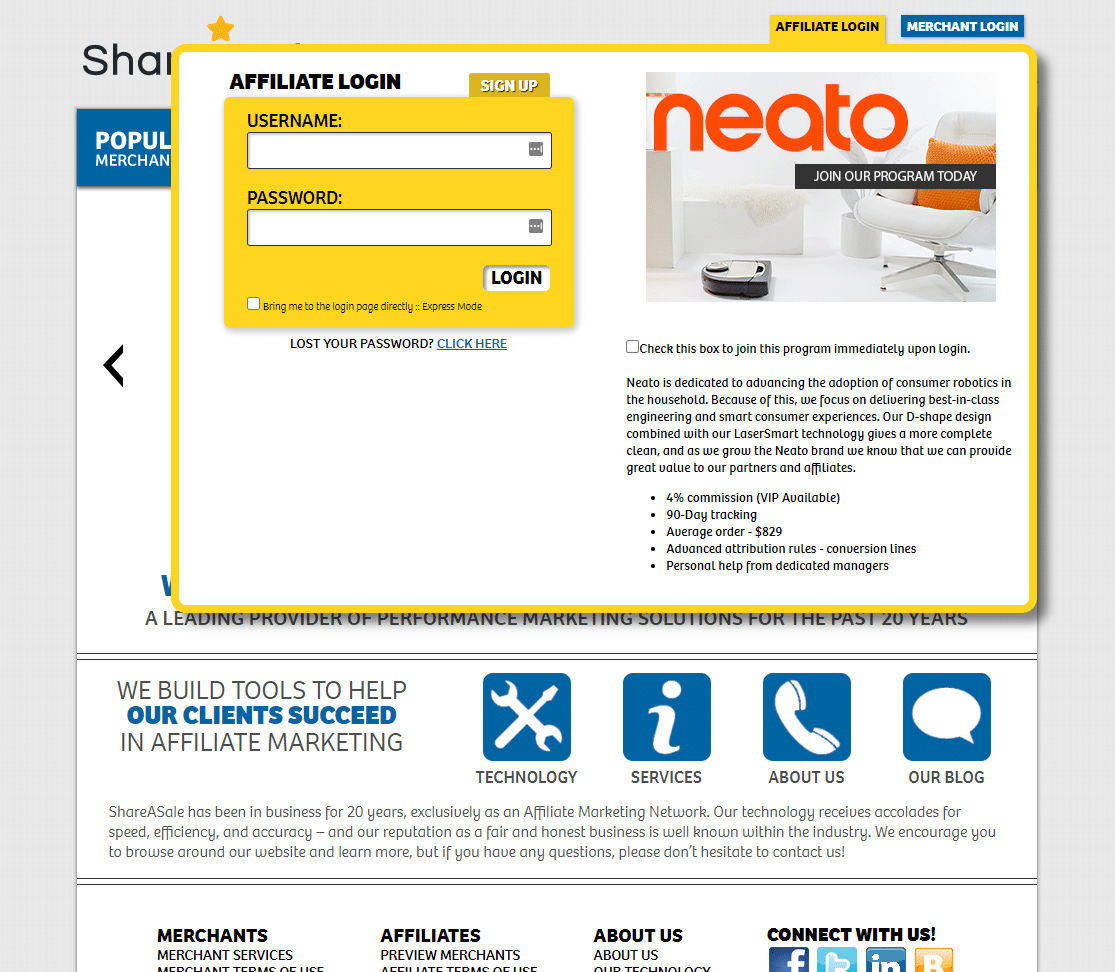
ShareaSale is one of the largest affiliate networks out there. Considered by many to be one of the best general affiliate platforms out there, it's definitely one of the heavy hitters (but also make sure to check out our Shopper.com review). ShareaSale and CJ Affiliate are the two largest general affiliate networks.
Beginning affiliate marketers tend to like ShareaSale because of the wide number of affiliate programs being offered. They also love the large number of high commission rates. They are the go-to for many companies or brand looking to break into affiliate marketing.
AvantLink
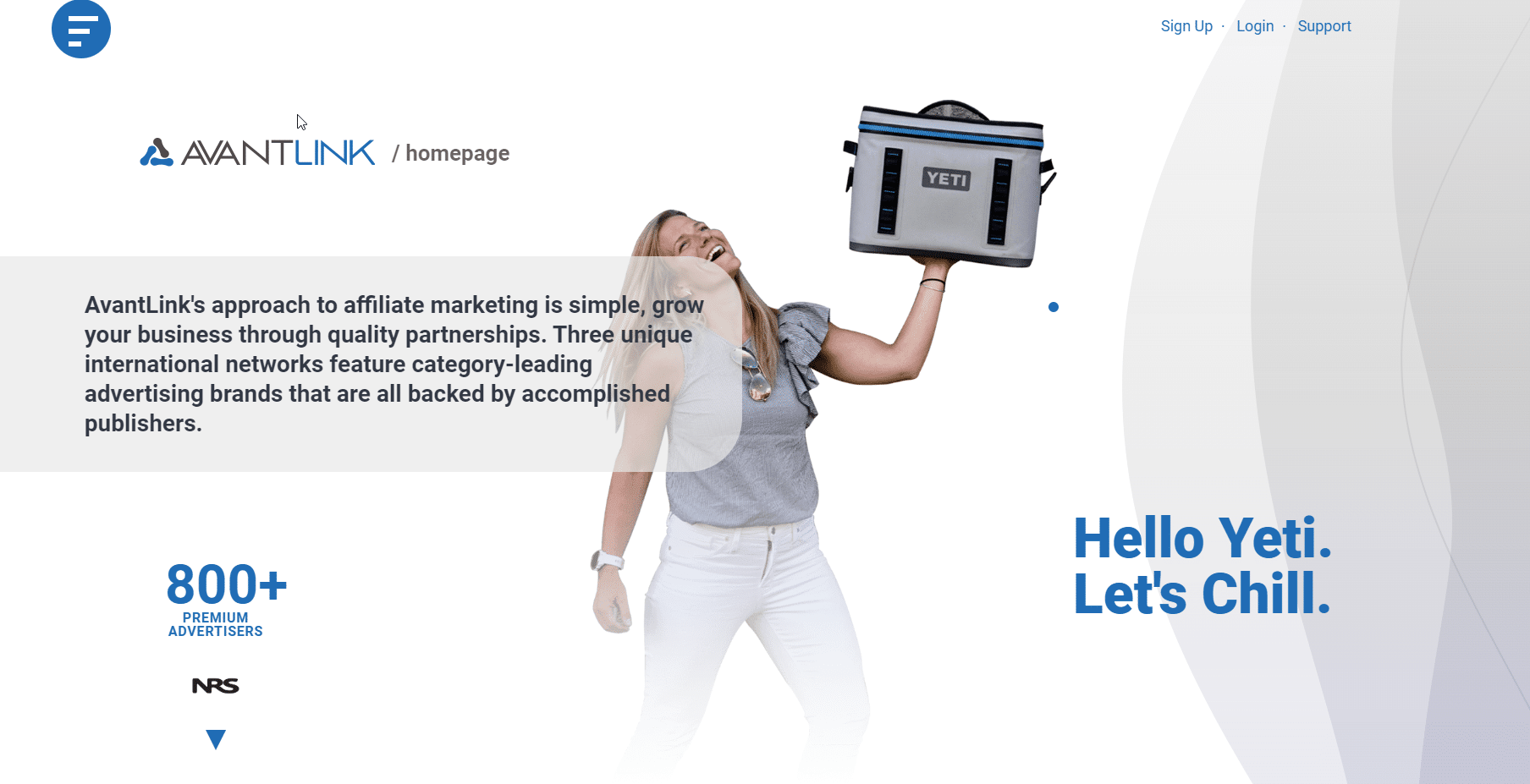
AvantLink goes a little bit further than CJ or ShareaSale. They're an affiliate platform that focuses on a specific niche. In this case, outdoor brands and outdoor websites. These platforms are a bit less uncommon but if they are focused on your niche it can be a great way to find exceptional deals.
Why look at a niche affiliate platform? Because usually these have many of the biggest and most trusted names in the niche. Products that are already popular and trusted by customers. There are big names that only scuba divers are familiar with. Same with rock climbers, mountaineering fanatics, or ultralight backpackers. When all the top brands of gear in those niches come together and offer 8, 10, or even 12% then it's worth it to find out where the top brands in your niche like to manage their affiliate programs.
AvantLink also displays some of the most aggravating terms of some affiliate platforms like unclear traffic guidelines for what qualifies you for the platform. This can be a major headache, but it is often part of learning how to navigate the affiliate world in the beginning.
Udemy
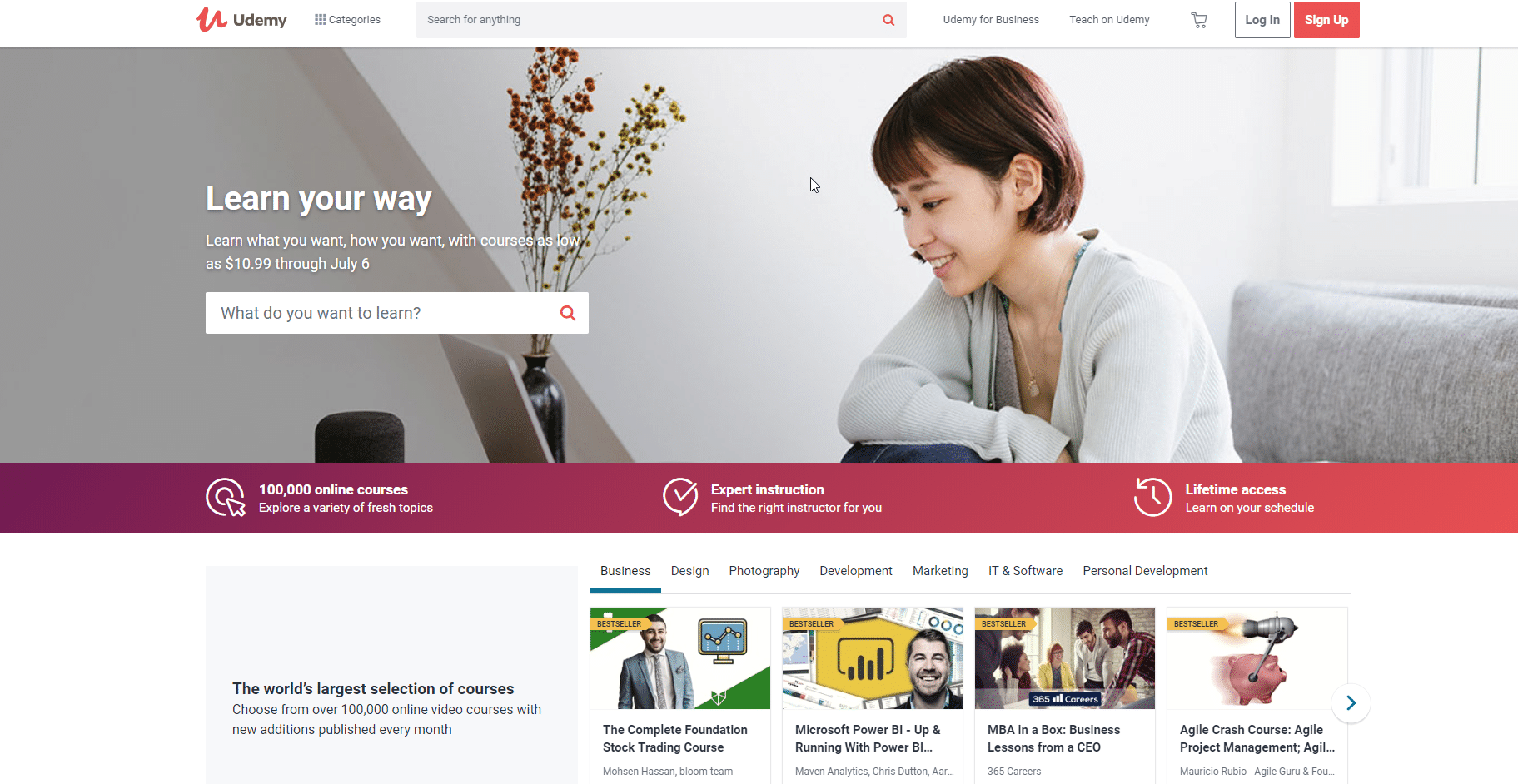
Udemy creates a great place where you can purchase online courses to learn a new skill. These courses can come in the form of ebooks, video lessons, or often a combination of the two. Some are basically a large teaching lesson in chapter form that is covered by many videos or recordings while some others creators choose to go a more conventional route. The main point is that there are courses for about every topic imaginable, created by experts who have the authority to actually teach on those topics.
Using the affiliate program that comes with Udemy gives you access to selling those courses that are related to your niche. In certain niches this will run the gamut from a variety of inexpensive ones to multiple high dollar courses that sell for hundreds. Udemy is only one example of literally dozens if not hundreds of online course platforms like this. Virtually all of which have an affiliate program.
Crash Courses in Affiliate Marketing Worth Your Time
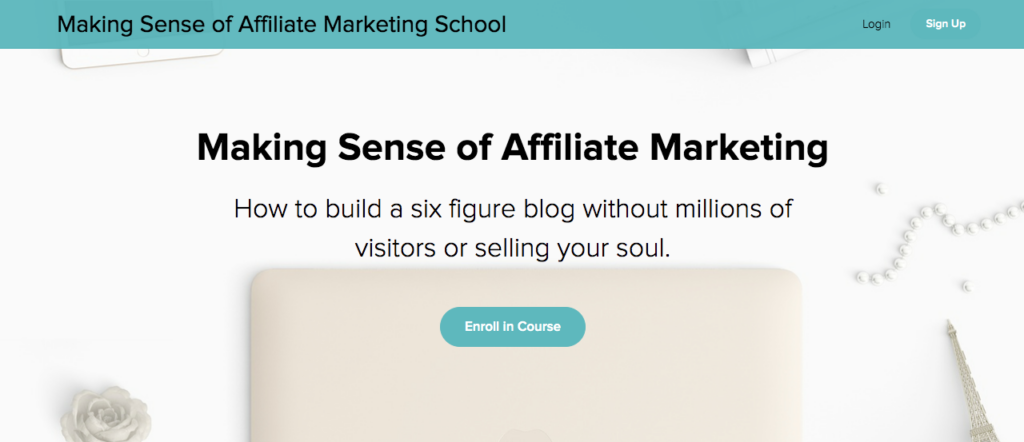
If you feel a bit overwhelmed or lost, or even if you aren't, it never hurts to get mentoring from experienced affiliate marketers who have done this before. Unfortunately, there are a lot of paid courses that are basically scams or not much above it. However, there are two major paid courses that bring years of proven experience, techniques, and results to your finger tips.
Those would be the Authority Site System and Making Sense of Affiliate Marketing. Each of these programs are created by affiliate marketers who have many years of experience making profitable websites and continue to do so. No matter what changes are happening online. Going through one of these courses means getting a detailed blueprint, step by step plans of all the technical skills you need to learn, and will frankly save you hundreds or even thousands of hours of learning to get results.
These aren't necessary to become a success if you're starting out with affiliate marketing as a beginner, but those courses will undeniably save you time and increase your results.
Individual Programs for Affiliate marketers
This comes from authority websites that have their own programs. For large enough websites or big enough experts, they may choose to go with creating their own course. If this is a valuable course that is proven, provides great information, and they have built trust with a large following over the years then this can become a very lucrative partnership.
Beginning affiliate marketers may have some difficulties getting in on some of these programs early. Terms can vary immensely. Your best option is to look for those individual websites or programs that already are encouraging affiliate sales. This indicates the website owners are open to paying commissions for sales. Not to mention the fact they are aware of the power that an affiliate marketing program can have for their bottom line.
Authority Site System & Making Sense of Affiliate Marketing are once again two great examples of this for the niches of affiliate marketing and making money online. They both come from websites with massive amounts of traffic. Both courses are from trusted sources created by experts in the field. There are proven track records with each course. Not to mention the clear ability to actually deliver quality information and training.
They both have affiliate programs in place.
However, this is just one example in one niche. If you're in other niches it's worth looking at who is offering their own affiliate programs, or products/courses that might work with an affiliate model. Increasingly, selling leads to businesses is becoming a really solid model for affiliate marketers to begin pursuing.
Pitching niche sites to Build an Affiliate Relationship

Normally you need to be a certain size or have a certain degree of success before this becomes an option. In other words, you need to prove that you bring value to the table first. If you can show you have traffic and an audience that would be interested in a product or service, then you can negotiate a contract to get a certain percentage of proven sales or leads. This is more work intensive and is best done once you have a little bit of experience in affiliate marketing.
This is a step that beginner affiliates should still look at and learn about because as they learn how to rank on search engines and drive traffic, more options will be open. Sometimes the best affiliate partnerships are ones you can work out with sites in your industry once you can prove you have enough traffic to make it worth their time.
This is often the last step after looking at existing affiliate platforms, programs, and pre-existing affiliate programs with individual websites, but it shouldn't be overlooked.
Steps to becoming an Affiliate marketer

Step 1. Choose a profitable niche
Picking your affiliate niche might be one of the most important decisions you can make. This goes for any website but especially for beginner affiliate marketers. You want to choose a niche that is going to be profitable. You also need to choose a niche that you can actually provide quality content about. The days of 300-word keyword stuffed posts crammed with backlinks are over.
Search engines want to give useful content. The better you know a topic, or are willing to research and learn about it, the better your content is going to be. You also need to make sure the niche is something you enjoy writing about. If you're an expert at cubicle based work furniture but you hate every minute spent thinking about it, then you're not going to last long enough to see any affiliate returns.
On the other hand, if you choose something you're incredibly interested in but it requires a specialized degree, education, or training that you don't have then that's going to be a tough sell, as well.
Keep in mind affiliate options here. Are you going to be selling specific products? Creating a course for training? How can you monetize a niche you're looking at? Can it realistically be done? 13th Century Neo-Romantic Hungarian Poetry might be really fascinating, but good luck finding an affiliate option for monetizing that one.
This is an area that is important to get right. Making Sense of Affiliate Marketing does a really great job of covering these steps if you find yourself struggling with the brain storming and more in need of a step-by-step blueprint for picking the actual niche. This can be an amazing aid for affiliate beginners.
Step 2. Finding Affiliate Programs and products within your niche
One of the most important steps is to find the perfect fit for your site. Or multiple websites. While there are products that give giant commissions, you're not selling credit cards on a camping website. Or kayak paddles on a site about saving money.
You need an affiliate program that actually matches up with your audience. That fit of interests is the most important single factor. Without that match, it doesn't matter how much traffic you drive. You'll struggle to convert enough of it to actually make a difference.
You also want affiliates who provide a decent payout. Many beginning affiliate programs have high traffic but relatively low payouts (1-5%). If you've followed Amazon over the past decade, the overall percentage going to affiliates keeps going in one direction and it's not up. In the beginning you might need to work with lower percentage affiliates until you get your feet under you as an experienced Internet marketer.
That combination of a good fit for your site and a good payout usually makes for a successful partnership. If you can add in trust due to your great content and name recognition on the side of the managing affiliate partner, then all the better!
Step 3. Build Trust
Creating trust is a crucial part of this process. You need to provide great information, convince visitors that you are an authority, and add value. Building trust serves two major purposes. One is to get in good with Google and other search engines.
Being an authority on a subject and a trustworthy source are major parts of how Google ranks websites. This is a major part of SEO. Building trust with the search engines is crucial. You can't get traffic if nobody can find you.
Trust also serves another common sense purpose in affiliate marketing: it makes it easier to make the sale. Most people are savvy enough now that they won't buy from a questionable website. Most of you reading this know how to spot someone who has done actual research on a topic and someone who spent the minimum amount of effort re-writing the product copy off of Amazon.
You're going to buy from the more trustworthy source 9/10 times. Minimum.
If you're not sure what to do next or where your focus should be just do one thing. Focus on creating more high quality, trustworthy content that adds value to the Internet instead of just cluttering it up. If that's your main focus, and you take massive action to continue doing that, you're not going to be disappointed with the results.
Common Affiliate Strategies

There are multiple affiliate strategies that are quite commonly used to get attention. Each article should have a lot of good information, but there are multiple ways to display this info. The success of each can vary based on the niche, the quality of the article, as well as the individual topic you're covering.
Understanding the following three techniques for displaying your content will give you plenty of options in testing out the many different ways you can effectively use affiliate links.
Listicles
A listicle is a classic way to display a long list. "Top 10 Hosting Plans for WordPress" can be ten different affiliate links to the companies that provide servers and other hosting services. A "Top 100 Ways to Make Money with a Side Hustle" can give tons of great information while also offering plenty of options along the way to put in appropriate affiliate links.
Listicles have been a mainstay of online articles for decades. They are easy to organize, give structure when writing, and often give a set number of options for something people are looking for anyway. Using this as a way of finding article topics can also be a powerful way to break through writer's block.
Direct Comparison Articles
These tend to be targeting very niche keywords, but that doesn't mean they can't be very profitable! A direct comparison article is going to catch the attention of people looking to make that buying decision. Possibly people who have already done a lot of research and have even narrowed down their options. Those are visitors who are much more likely to buy than someone just randomly browsing around online.
These come in the form of "Product A vs. Product B" or "Service A vs. Service B" articles. In some cases you may even have three instead of two. The key here is to focus on the very specific similarities and differences between the two. Someone looking at this type of article wants an answer. Even if it's along the lines of both being great, but one slightly better overall while another option is slightly better for a very specific narrow type of use.
Being able to clearly tell readers the strengths and weaknesses of each option, especially in comparison to each other, is a great way to set up the sale with your affiliate links.
Resource Pages
Some very niche sites have found resource pages as an effective way to get more out of their affiliate marketing efforts. This is one that I've used to limited success on past niche sites. There are others who absolutely swear by this method. On the plus side this allows you to organize and display premium recommendations that you recommend.
This can be a high content page that is available in the header. This means it's always available to a visitor to your site no matter which article they landed on. If it's educational, well-organized, and features multiple premium products then this can be a great way to add more affiliate sales. In some instances, this could be a way to increase high paying sales for keywords in your niche that are especially hard to rank for.
That way even if you can't get your article on page one for that specific topic, visitors on other pages of your website still have a chance to see those high-paying affiliate links.
Links vs. Buttons vs. Linked Pictures
Have you ever noticed how different sites choose to monetize? There are many different methods out there. On my largest affiliate site I use a lot of product review listicles where the buying links are a linked picture (which clearly states it is linked to stay on Amazon's good side) and a Check Current Pricing or Buy Now button at the end of each section.
If you've looked through Niche Pursuits you've seen a lot of bolded text links immediately followed by a button. There are affiliate sites that do very well that don't use any buttons at all. On one particularly profitable article on my site the only monetization on the page is a bullet point list of product names – each one connected to an affiliate link.
In other words, there are many different ways to get the actual links into the article. You don't want to over do it and look spammy. However, if you really are providing top-notch content full of value then this shouldn't be an issue. In most cases to provide that level of information you have to include a lot of great information. Which, of course, gives you plenty of places to put in those links.
Experiment with these options. If you focus on products, take a look at different chart designs. There are many different ways to monetize your content with affiliate links. You will often find that the most effective styles will vary based on the niche. Even on the same site different methods may work better for different articles or pages.
Test, record the information, and test some more. Eventually you'll find you're not a beginning affiliate marketer anymore but one who really knows how to bring in those affiliate sales!
How to maximize your chances of affiliate marketing success
While the information covered so far gives you the tools you need as a beginner affiliate marketer, here are some more tips that can help improve your performance. Affiliate programs love a high-performing affiliate. Small changes sometimes can make a major difference. Especially when they all start getting added together.
Create Incredible Content
No matter which of these common affiliate strategies you use, it won't work without great content. While this is a point we've beat on again and again, there's a reason for that. Affiliate marketing involves SEO, marketing, and selling. Great content is an essential part of that equation. It needs to useful, well-organized, and reliable.
This doesn't mean you need to be William Shakespeare. In fact, it's better if you don't write in a fancy convoluted way. Writing in a simple voice is ideal. Write in a way that is easy to understand. Not an attempt to show off.
Constantly Test Link Placement
This can sound intimidating at first but at the end of the day it really isn't. Link testing or A/B testing isn't super scientific or hard. It just means trying different things and recording the results. Eventually you'll have enough information to know what works the best. You'll also know the worst converting setups and learn to avoid those.
This testing was something I avoided for a long time, and I regret that. This is actually far easier than it sounds. The information is invaluable. So is going from 8% conversion to 12%. I left thousands of dollars on the table over the last few years by waiting so long. This is a rookie affiliate marketing mistake that even veteran affiliates make.
Move that comparison chart a little bit higher. Move the first "Buy Now" button a little bit lower on the page. See what happens. The small amounts you lose out on here or there don't compare to discovering that a few small changes will literally increase your income by 20%, 50%, or more.
Check Picture Quality

There's no excuse in this day for a blurry picture. Not with today's cameras, smartphones, or even screenshot software. Make sure all your pictures look good. You don't want to waste hours looking for the perfect shot. That said, it's a common novice affiliate mistake to think the quality of the picture doesn't matter. It does. And don't forget those Alt Tags!
Aim for Qualified Traffic
Not all traffic is created equal. This also goes hand in hand with making sure your affiliate offer matches your audience interest. While it can be tempting to keep trying to push the highest paying offer that is even remotely related, this won't work. The closer your affiliate links are to what the article is about, the higher the conversion rate is likely to be. If you're shopping for a fillet knife you're not looking for a bass boat (but maybe you are interested in cool boat names). If you're looking for an SEO course you're probably not looking at a high cost PPC program.
One mistake beginning affiliates often make is falling for the many scammy deals out there promising giant email lists or tons of traffic. Often times those offers don't deliver at all, or they deliver hits via bots or disinterested freelancers who get paid peanuts to ping your site for twenty seconds before moving on to the next one. These aren't good deals. Any traffic you get isn't going to be good traffic.
This is why understanding SEO and how to rank in search engines is crucial for affiliate marketing success. You need traffic from people actually looking for what you provide information (and affiliate links) for. There are some examples of driving quality traffic from certain social media sites. While possible, this is much trickier than using search engine optimization for the same purpose.
The Right Plug-Ins Matter
WordPress has plenty of plug-ins that can make a difference. Yoast SEO is a classic. Finding plug-ins that help optimize the size of images or optimize your site speed can do wonders to help you rank higher in the search engine rankings. Especially if your competition isn't doing the same.
Getting the right plug-ins to make your website faster, better, and more efficiently can do the little things that help you to be found online. A better website means better results as an affiliate.
Choose a Passion Niche
One of the smartest moves you can make in affiliate marketing is choosing a niche or topic you're passionate about. If you started out with something dryer but have a way to tie it into things that interest you more, that can work, as well.
Learning the ropes of affiliate marketing as a beginner is going to take a lot of time and work. Choosing something you are passionate about will help drive you through those inevitable tough times during the learning curve.
Spend Money to Save Time
There aren't many great courses out there. However, there are two that are worth their weight in gold. While it's understandable that many new affiliates want to shoe string it in the beginning, some investment is worth it.
Ignore the courses promising the sky and the moon or that claim minimal work is needed. No such thing in affiliate marketing. Courses like Authority Site System and Making Sense of Affiliate Marketing, on the other hand, take years of experience from expert affiliates who can save you those years of trial and error and provide the blueprint to give you the guidance to speed up the process.
Becoming a successful affiliate still requires work. Having a proven blueprint to get you there definitely helps out. This can speed up the process, help you make more money faster, and learning from the masters is a great way to become one yourself.
Importance of Legal Compliance
While there are amazing opportunities for affiliates, there are rules in place that need to be followed. Ignoring these can actually put you in trouble with the FTC or other commercial bodies and dry up your profit completely – not to mention get you fined and in legal trouble. These are all problems that you definitely want to avoid.
Affiliate Disclaimer
Every website needs to have an affiliate disclaimer. This is almost always a requirement of every affiliate program out there. You need to be open about your relationship with any program you're working with. In addition to this, in the United States the FTC expects there to be an affiliate disclosure on all affiliate sites. Not having one can lead to a wide array of penalties, none of which are good.
Why put your earnings at risk? Why put your website at risk? That's not even taking into account the fact fines and a court case from legal issues can follow. A simple affiliate disclaimer also works to give benefit of the doubt if a few extra tweaks need to be made. In other words, you're more likely to get a warning to correct before straight up punishment.
FTC Best Practices
FTC best practices list specific things that every affiliate website should have. This generally features two main parts. The first is an affiliate disclosure going into detail about how your relationship with these affiliate partners works. This includes making profit off any and all purchases made. The second piece of staying in the FTC's good graces means also having a privacy policy that discusses how cookies work, what information is collected from visitors, as well how that information is used.
GDPR Privacy Policy Compliance
The GDPR caused a bit of a panic when it was first rolled out. There's no reason to let old posts or warnings put you in a panic. The GDPR is the European Union's stricter policy guidelines for affiliates. This gives heavier protections on data privacy and affiliate disclosure for those websites that are doing business in Europe. This includes websites based elsewhere that sell in Europe via programs like Amazon UK or any Amazon program in EU countries (Germany, France, Spain, Italy, etc.).
Look up the rules on what needs to be disclosed. Then implement those changes after learning how. You can also use the litany of free online tools that will provide a standard GDPR custom template you can then customize for each of your specific affiliate websites. It's a one-time step that then has you covered. No sweat.
Affiliate Marketing for Beginners Cheat Sheet
There's a lot of information here to absorb. Affiliate marketing isn't easy, but it can definitely be worth it! Anyone has the ability to learn the skills needed to succeed as a new affiliate marketer.
- Decide on a niche you're going to build a website in
- Look for good affiliate programs to partner with as you build your website
- Purchase Authority Site System or Making Sense of Affiliate Marketing to skip months or even years of trial and error – and get on the right path as quickly as possible
- Make sure to include an affiliate disclosure, privacy policy, and GDPR statement as pages of your website
- Create mountains of high quality content that delivers value while including affiliate links in the content
- Test your affiliate link setup once you have enough traffic
- Rinse, repeat, and keep on learning!
Become an Affiliate Marketer today!
There are many people who claim the golden age of affiliate marketing is over. People said that in 2005, as well as 2008. Then 2010, 2012, and pretty much during every single change in Google's algorithm or major affiliate's commission structure. People are still starting brand new websites that are making four, five, or even six figures or more a month within the past couple years. In other words, even true beginners should ignore the static and get started.
Affiliate marketing for beginners doesn't need to be overwhelming. You get paid for selling products you don't have to make, send, or ship. That's a pretty good deal and explains why becoming an affiliate marketer is such an attractive route for making money online. Become an affiliate by starting today. A year or two years from now you'll be glad you choose to get started now!
Want to learn step-by-step how I built my Niche Site Empire up to a full-time income?
Yes! I Love to Learn
Learn How I Built My Niche Site Empire to a Full-time Income
- How to Pick the Right Keywords at the START, and avoid the losers
- How to Scale and Outsource 90% of the Work, Allowing Your Empire to GROW Without You
- How to Build a Site That Gets REAL TRAFFIC FROM GOOGLE (every. single. day.)
- Subscribe to the Niche Pursuits Newsletter delivered with value 3X per week
My top recommendations
















